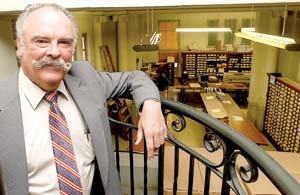After more than two decades on the job, he’s seen a lot of
changes.
Over and over he’s witnessed the sting of defeat and the elation
of victory.
After more than two decades on the job, he’s seen a lot of changes.
Over and over he’s witnessed the sting of defeat and the elation of victory.
And as the tension builds toward the outcome of today’s election, County Clerk John Hodges is gearing up for just another day at the office.
Hodges, 64, became the County Clerk/Auditor/Recorder in January of 1983 after serving in several city and county governmental positions.
A Hollister native, Hodges worked in the County Assessor’s office for 10 years before starting an auto service center. During that time he sat on the City Council and served as mayor.
“A couple supervisors at the time said, ‘Hey Hodges, why don’t you throw your hat in the ring and run for county clerk,” he said. “So here I am.”
Going on his sixth term in office, he’s only been challenged a couple of times, which is fine with him because he enjoys his job.
“Nobody wants my job, so if nobody wants my job somebody’s gotta do it,” he said.
Like any person who has been doing the same job for years, Hodges has reams of stories and memories of past elections gone wild, faulty machines and fanatical voters championing their causes.
While much of the election process is still the same, save for technological advances in ballot counting machines, several practices that went on in days past seem almost ludicrous in today’s precise, analytically driven society.
One poignant election that stands out in his memory was a tight race for City Council in the mid-1980s, that against all probabilities, ended up being a dead heat, Hodges said.
After hand-counting each of the approximately 6,000 ballots twice and coming up with the same conclusion, the City Council came up with a way to break the tie, he said.
“They drew sticks,” Hodges said. “The one who had the biggest stick – he’s the one who became the city councilman.”
The hubbub surrounding elections makes the years without an election somewhat anticlimactic. The 2004 elections, including the November presidential race, shouldn’t disappoint as far as excitement is concerned, he said.
The controversial growth control initiative, Measure G, has created a buzz that Hodges hasn’t witnessed in all his years in office.
“This is one of the first where I’ve seen something like Measure G take a division in families in the magnitude like it has taken right now,” he said. “It’s too bad.”
Over the past years, voting has increased from about 8,000 registered voters to the current 26,000.
Even with the sensational back-and-forth exchanges between the proponents and opponents of Measure G, Hodges predicts only about 40 percent of registered voters will make it out to the polls.
“And those are the diehards,” he said. “People that do vote are the ones who care. But there’s a lot of people out there who don’t want to be bothered. They figure their vote doesn’t count – what good is it gonna do?”
Not voting, or assuming a certain candidate will win by a landslide, can have monumental effects on a close election, Hodges said.
“I’ve seen real tight races where, had that one person just come and voted, it would have changed the election,” he said.
Extremely close races where the outcome hinges on several votes, while rare, create added stress on the election’s staff and can foster a sense of ambiguity for the public.
“We like to have wide margins,” he said. “Like this one. Measure G could be real close, and I don’t like close races.”
Throughout the years, Hodges’ position has kept him in touch with his community, which he cherishes because of his family’s long, generational history in the county.
The thought of retirement hasn’t crossed his mind, and as long as the residents of the county see fit, he will continue his work at his long-standing post.
After the 2004 elections, he will oversee the county’s accrual of new touch screens that will bring it into compliance with federal elections laws, along with the decimation of hanging chads and time consuming ballot counting.
Even with all the changes, Hodges has kept one thing constant over the years.
“We bend over backwards to make sure the customer comes first,” he said. “We don’t have ‘No, I can’t’ in our vocabulary.”










